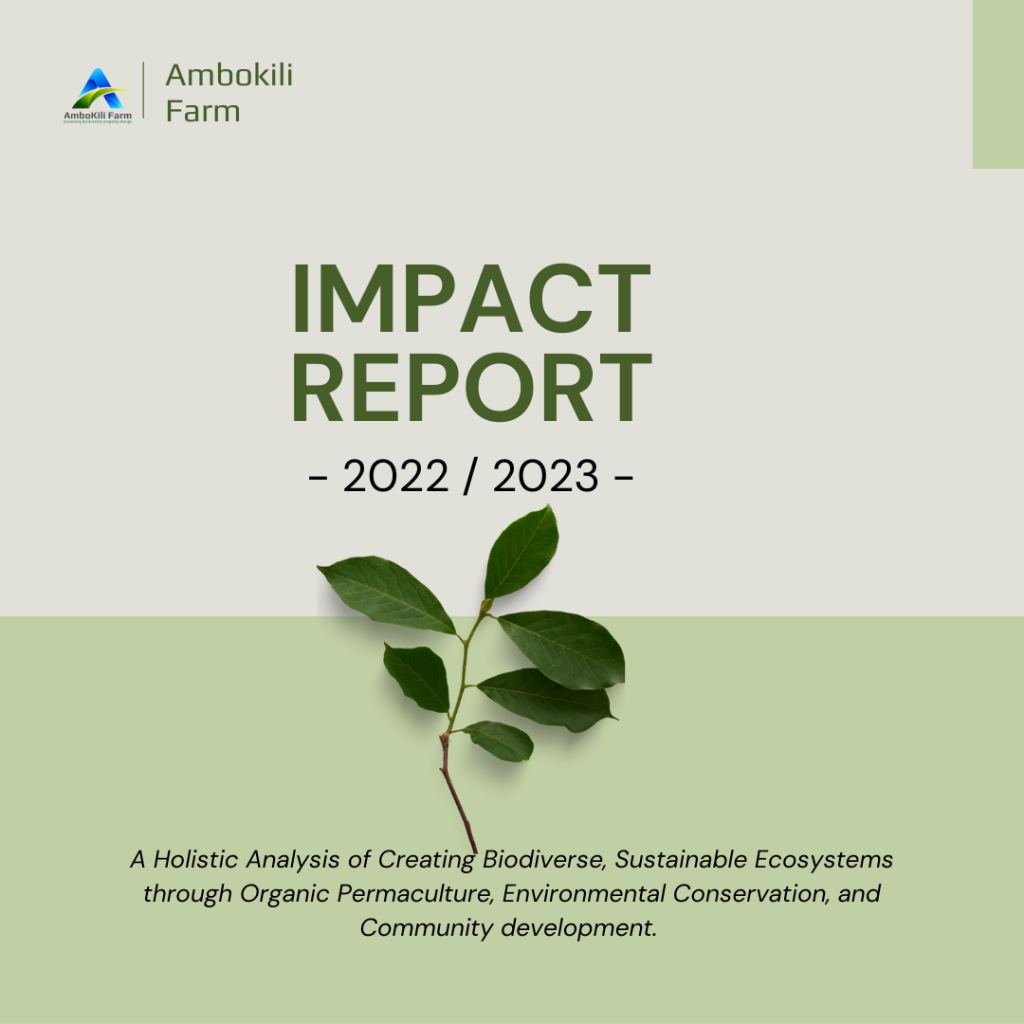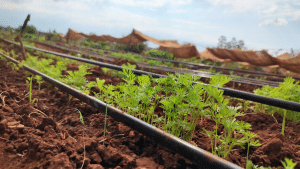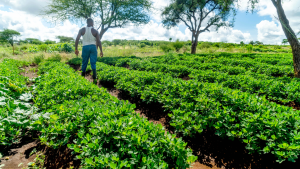
Ambokili Farm Impact Report 2022/2023: A Holistic Analysis of Creating Biodiverse, Sustainable Ecosystems through Organic Permaculture, Environmental Conservation, and Community development.
Abstract
This report evaluates Ambokili Farm’s impact on environmental sustainability and conservation, biodiversity, and community development. The findings underscore the positive outcomes in terms of chemical reduction, biodiversity increase, soil health enhancement, job creation, economic growth, and community welfare.
Significant improvements in soil health, biodiversity, and crop yield were observed, alongside positive impacts on local food security, job creation, and agricultural knowledge sharing.
Introduction
Ambokili Farm is an Organic Farm that transforms semi-arid terrains into thriving, biodiverse, self-sustaining ecosystems for communities through organic permaculture, environmental conservation, and community development.
Ambokili Farm’s commitment to organic farming serves as a model for sustainable agricultural practices, aiming to strike a balance between environmental preservation and community development. The farm’s initiatives are meticulously designed to address various facets of agriculture, with an emphasis on organic practices and community well-being.
Impact
Environmental Impact
Chemical Usage Reduction:
Ambokili Farm achieved a 100% reduction in chemical usage by exclusively practicing organic farming. This approach mitigates environmental pollution, safeguards ecosystem health, and ensures the production of chemical-free food. This underscores the farm’s commitment to environmental sustainability and the preservation of ecosystem health.
Biodiversity Increase:
The farm has witnessed an exceptional 300% increase in biodiversity. From a barren landscape, Ambokili Farm has transformed approximately 80% of its land into a thriving ecosystem, displaying the successful integration of various plant species through agroforestry and organic farming practices.
Implementation of natural erosion control methods and the cultivation of vetiver grass played a pivotal role in fostering biodiversity.
Soil Health
Improved Soil Organic Matter:
Through the diligent use of manure and the establishment of a compost site, Ambokili Farm has significantly improved soil organic matter, contributing to enhanced soil fertility and long-term sustainability.
Reduction in Soil Erosion Rates:
Utilising innovative techniques such as contour terracing– Fanya Juu and Fanya Chini channel terracing, and the cultivation of Vetiver grass, the farm has successfully mitigated soil erosion. Ambokili Farm’s comprehensive initiatives have reversed the impact of deep gully erosion and sheet erosion, demonstrating effective soil conservation methods.
Crop Yield and Quality
Annual Crop Yield Growth:
In less than a year, Ambokili Farm has witnessed substantial growth in crop yield. Transitioning from no vegetative cover to cultivating diverse crops on expanded acreage.
Companion planting and diversified crop cultivation, including maize, onions, tomatoes, watermelon, and more, has resulted in a significant increase in revenue, exemplifying the economic viability of sustainable farming practices.
Comparative Quality of Organic Produce:
While conventional produce may exhibit better phenotypical qualities, Ambokili Farm prioritises organic practices, controlling pests at the economic injury level (The lowest population density of a pest that will cause economic damage; or the amount of pest injury which will justify the cost of control). This choice aligns with the farm’s commitment to providing healthier, chemical-free and more sustainable produce to the local community.
Positive Impact on Local Food Security:
The farm’s initiatives have positively impacted local food security by providing nutritious food to workers and the surrounding community. Fish farming further aims to enhance protein availability and contribute to nutritional security.
Community Engagement
Job Creation
Ambokili Farm has created 28 jobs offering fair wages and adhering to county wage laws; fostering economic growth and providing fair wages to workers. The farm’s commitment to following county wage laws and ensuring workers’ well-being has created a positive ripple effect within the community.
Economic Impact
Cost Savings Due to Sustainable Practices:
While initial costs in organic farming are higher, Ambokili Farm realises long-term cost savings by minimising the need for pesticides and synthetic inputs, aligning with sustainable practices.
Contribution to the Local Economy:
Ambokili Farm’s contribution to the local economy extends beyond revenue generation. Farmers in the community can get seeds from the farm, fostering independent cultivation and economic empowerment.
Additionally, he farm’s presence has transformed once-barren land into actively cultivated acres, creating a positive economic ripple effect.
Innovations and Research
Adoption of Innovative Techniques:
The community is gradually embracing organic farming practices, inspired by Ambokili Farm’s success and positive experiences e.g. vegetables that do not give them digestion issues. This signifies a growing interest in sustainable agricultural methods.
Positive Feedback and Market Demand:
Customers report higher satisfaction with Ambokili Farm produce, attributing it to improved taste and a lack of digestive issues when consumed. The farm’s commitment to quality resonates positively with consumers.
Market Demand for Organic Produce:
While market demand for organic produce is currently low, the farm anticipates a significant shift with increased awareness and positive experiences. Positive experiences are likely to drive increased market demand.
Percentage of Repeat Customers:
With an impressive 90% repeat customer rate, indicating a high level of satisfaction. Word-of-mouth referrals continue to contribute to the farm’s growing customer base.






